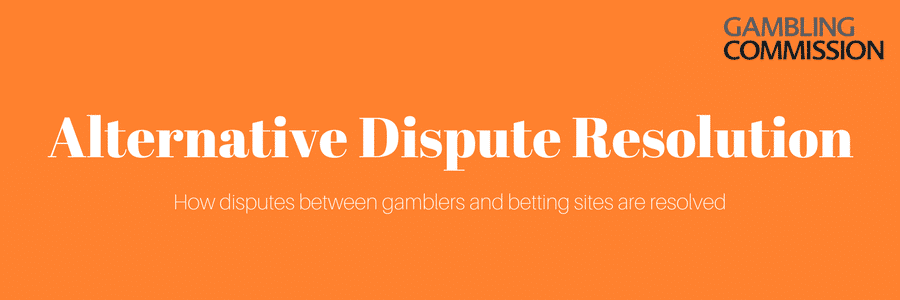Online Gambling Alternative Dispute Resolution System

Alternate Dispute Resolution providers (ADRs) are third-party services whose purpose it is to resolve disputes between consumers and businesses without taking small cases to court. When we speak of online gambling specifically, ADRs are intended to function as neutral mediators when disagreements arise between players and betting sites.
If a player believes he or she was mistreated and is unsatisfied with the operator’s first response, the player may contact an ADR for assistance in settling the dispute. The player and operator both present their cases to the ADR and then the ADR begins the process of working out a fair solution for both parties.
UK gambling law requires all licensed betting sites to appoint an ADR from a list of providers approved by the UK Gambling Commission. This is just one more reason to always play with sites that are legal and licensed. If you play online at sites licensed in the UK, you can do so knowing that you always have an ADR available should you get into a serious disagreement with your betting site.
Additionally, UK-licensed sites are required to publish information on their websites informing customers of the existence of third-party dispute resolution. Operators must also post which ADR provider they work with and how that ADR may be contacted.
Eleven ADR providers are currently approved to act as ADR providers for online gambling sites. However, a March 2017 review of the ADR system conducted by the UKGC stated that the UKGC is considering reducing the number of ADRs and tightening the standards for those that survive the culling process.
We will be discussing the ADR system from a UK-centric point of view, but players around the world benefit from the existence of the ADR system. If a betting site accepts customers from your country and it is licensed in the UK, you can make use of the ADR to file complaints and resolve disputes.
How the ADR System Works for Players
The UK Gambling Commission advises players to contact an ADR provider only after they have first attempted to resolve the issue with the betting site in question. If the player has gone through that site’s internal complaints system without a satisfactory solution, only then should the player contact the ADR.
ADR services are provided at no cost to players. However, the UKGC does state that if you need to provide any additional information/documentation, the responsibility will fall on you to cover any costs for that. Typically, there will be no costs associated with doing so because most complaints will involve only you describing the dispute in your own terms and providing screenshots, chat logs, copies of e-mails, and possibly bet histories from the operator.
After you submit your complaint, the ADR will let you know that they have received your complaint, and then they will try to solve the issue within 90 days. If the ADR believes the process will take longer than 90 days, they will let you know.
If the ADR does not find in your favor, that is considered the end of the matter under the ADR system. But you do have other options if you are still not satisfied with the findings. UK law states that all wagers made since September 2007 are legally enforceable under the law. This means you can take the complaint to court, but it will be up to you to find an attorney and deal with the costs of going through the formal legal system.
Licensed betting sites in the UK are required to keep records of all disputes managed via the ADR system for a minimum of twelve months. Similarly, betting sites are required to notify the outcome of all ADR disputes and send a copy of the decision to the UKGC.
One thing worth keeping in mind is operators and players may agree to use any approved ADR to manage a dispute, but operators ultimately have the final say in which ADR they use. If you wish to use an ADR other than the one chosen by your betting site and they refuse to budge, you have no option but to use their preferred ADR.
Online Dispute Resolution Platform
The online dispute resolution platform (ODR) was introduced to the European Union and the UK in an effort to streamline the alternative dispute resolution process. It allows consumers and businesses that sell goods and services online to settle disputes online. Consumers and businesses may use the ODR to submit complaints, respond to complaints, and settle disputes online.
Participation in the ODR is not mandatory for all “online traders” in the European Union, but they are required to notify customers of its existence to customers. Each country may also impose additional standards for the online gambling industry. In the UK, the Commission requires licensed gambling sites to inform customers of the ODR and provide a link to the ODR platform.
The purpose of the Online Dispute Resolution (ODR) website is to resolve disputes between players and gambling sites based in Europe without going to court. If you have a problem getting paid or feel that you somehow got the raw end of a bad deal, you can now file your complaint with the ODR for a quick resolution.
How the ODR Works
The ODR allows disputes to be settled entirely online. If you have a dispute with a betting site, you can visit the ODR website to submit a complaint form. The ODR will then contact the operator and the operator will be given 10 days to respond with its preferred ADR provider. Once you and the betting site operator agree to the ADR provider, the ODR platform will transfer the dispute to the ADR, and the ADR will handle the complaint completely online within 90 days.
For example, let’s say you claim a sports betting bonus from a gaming website, and then later, they tell you the bonus has been voided based on some obscure wording found in the terms and conditions. You feel that you’ve been ripped off and would like to address the issue. To further complicate matters, you discover that the betting site is headquartered in a different country than where you live.
If your complaint to the betting site in question goes unheard, it would normally be an expensive and time-consuming matter to take them to court. Most people in this situation end up taking the loss and maybe leaving a complaint on an online discussion forum. That is hardly an ideal resolution.
The ODR seeks to simplify the matter by giving players and operators a central platform to resolve these types of issues with the help of approved alternative dispute resolution (ADR) entities. ADR entities are approved on a case-by-case basis by the EU to ensure they meet EU standards and are registered with national authorities. In short, you can use the ODR website to bring your complaint to a legitimate dispute resolution organization.
An image from the ODR website explains the process in simple terms:

When the ODR platform launched, the UK Gambling Commission reminded operators that they will be obliged to notify customers of the existence of the dispute resolution platform:
Online businesses must provide signposting to the ODR platform from 15 February. Not only must they link to the ODR platform on their website, they must also inform consumers of the existence of the ODR platform and the possibility of using the platform to resolve disputes, and they must include this information in any standard terms and conditions of business. If an offer is made to a consumer by email, the email must contain a link to the ODR platform. The guidance to businesses states that ‘traders may prefer to signpost consumers in the same member state directly to their approved ADR provider in the first instance…if they believe it would be a simpler route to attempt to settle the dispute‘.
Complaining to the UK Gambling Commission
The UKGC does not involve itself in complaints and is unlikely to help you on an individual basis unless it is clear the operator has violated the conditions of its gambling license. Submitting complaints to the UKGC is mostly a fruitless effort for players requesting help with specific disputes, but the UKGC does welcome consumer feedback.
While the UKGC rarely gets involved in individual disputes, the UKGC does monitor ADRs for compliance and does read complaints sent by customers. The UKGC will not update you on any investigations it opens into ADRs, but your feedback could have an impact if the ADR is not operating according to the conditions of its status as an approved gambling ADR.
2017 UKGC ADR Report
In March 2017, the UK Gambling Commission released its first annual report on the state and effectiveness of the ADR. Overall, the findings of the Commission were negative, as the UKGC noted several disturbing trends. The report noted two trends in particular that were especially concerning for regulators:
- A 2007 survey found that 61% of participants who gambled during 2007 believed gambling was fair and could be trusted. By 2016, only 38% of respondents agreed.
- The Commission received 77,000 contacts from members of the public in 2016, which was an increase of more than 300% over the previous two years.
The final report concluded that current complaint and dispute resolution schemes are not meeting consumer needs. The UKGC is now contemplating and considering major changes in how customer complaints are handled.
This month (May 2017), the UKGC will begin the process of improvement with an ADR provider roundtable. The UKGC also plans to look at complaints processes in other non-gambling industries where the process seems to be working better in order to learn how the UKGC and ADR systems can improve results for customers.
The annual report also specifies three challenges or goals they wish to meet moving forward:
- For gambling operators to take complaints more seriously, ensure complaint procedures are truly accessible, and to invoke a sense of trust among customers
- For ADR providers to ensure they are doing enough to help raise standards in the industry. This includes possibly sharing lessons learned from complaints and ensuring their processes for resolving disputes and their relationships with betting sites allow ADRs to independently and transparently resolve complaints.
- For the Gambling Commission to put in place effective rules and standards for both gambling sites and ADRs
Another conclusion that stood out in the report was the Commission’s finding that its approval of eleven ADR providers failed to achieve the desired results. Originally, the UKGC approved eleven ADRs in the hopes of giving customers great choices in ADR providers and stimulating competition among ADR providers.
In the report, the UKGC concluded that its standards for ADR providers are not specific to the gambling industry and therefore led to inconsistency of standards across different providers. This led to customers, as a whole, not always receiving quality customer service from various ADR providers. With that in mind, the UKGC is now considering reducing the number of providers and implementing stricter standards for approved providers.
Kudos are also due to the UKGC itself as it too takes some responsibility for the current unsatisfactory state of the online gambling complaints process. The UKGC is also committed to making improvements to its own processes.

Wes Burns has more than a decade’s worth of experience as a writer, researcher, and analyst in the legal online betting industry and is co-founder of OnlineBettingSites.com. Wes approaches his work from the viewpoint of players.


